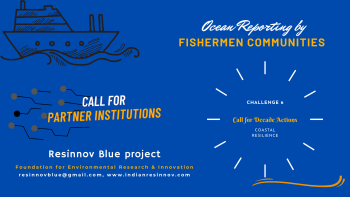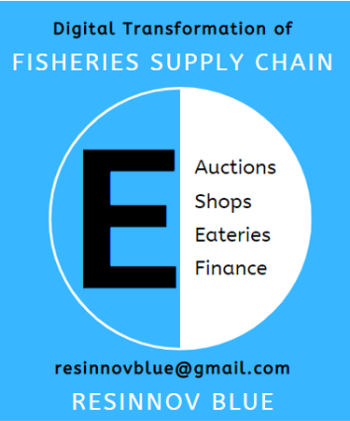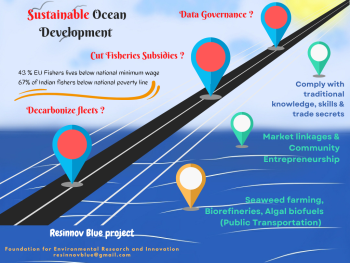Scaleup of Research from Lab to Market
Foundation for Environmental Research and Innovation strives to commercialise viable research outputs to resolve grass root level issues. Several significant Research and Innovation outputs often gets stuck in laboratories or institutions, that deserves further support beyond technology demonstrations to reach commercial markets, so as to benefit societal and technological transformation. Commercialisation of research essentially involves engagements and collaborations with multiple stakeholders such as researchers, entrepreneurs, promotional agents, marketing professionals, sales experts and the like. FERI Trust prioritize 'Lab to Market' as among the key activity to facilitate knowledge dissimenation among science and society, through consultancies, projects, collaborations and capacity building programs.
The scientific and research team of FERI have expertise to offer consultancy & services in the areas of coastal resilience, climatic projections, sustainable fishing village development, ocean reporting, digital transformation, marine entrepreneurship, geospatial solutions, wetland management, natural resource management and participatory approach.
Few among the prioritized domain for Lab to Market technologies, research and strategies that we are currently engaged are as below.
Ocean Reporting by Fishermen Communities: Did we sufficiently tapped the potential of fisher folks to generate ocean data ?
FERI Trust perceive that fishermen communities could generate more Ocean data than scientific communities, if aligned. Looking at the vast number of fisher folks engaged directly with coastal waters, it is assertive that they could generate more real time ocean data with more area coverage than scientific institutions and equipment.
Ocean science and forecast model validations are incomplete without bridging the gap between traditional and scientific knowledge. The data generation technologies at lab scale can be transferred to fishermen through capacity building programs and deployment of oceanic equipment.
The Resinnov Blue project of NGO FERI Trust, is focused on engaging fisher folks for new ocean data generation towards digital representation of Indian Ocean. India have around 4 million marine fisher folks !

Connect with us at resinnovblue@gmail.com if your institute is interested for collaboration on the theme Ocean Reporting by Fishermen communities.
SaaS for Fisheries: Software as a Service (or SaaS) could facilitate digital transformation of fisheries sector in multiple ways. Fisheries entrepreneurship if integrated with SaaS can explore new horizons of E-Auctions & E-Commerce towards better market linkages. Traceability and quality verification are always the desired features to enhance the customer confidence and transparency. We are ambitiously engaged in implementation of SaaS for fisheries sector, that will enhance the livelihood of fishermen communities as well as upgrate the conventional fisheries supply chain with digital technologies and quality monitoring.

Consult with us to collaborate for regional level implementation of the digital solutions for fisheries supply chain management.
Climate Resilience & SDGs: Doesn't the roadmap to sustainable development entails rethinking on its priorities ?
FERI Trust perceives that the WTO agreement to curtail fisheries subsidies could have detrimental impacts on multiple SDGs (1, 2, 8, 10, 11). Around 43% of fishers of European Union still lives below the national minimum wage, while in India around 67% of fishermen communities lives below the national poverty line. Govt. of India rightly refused to accept the WTO agreement. In the absence of public subsidies, the already stressed and financially bonded communities will become more vulnerable to private money lenders/supply chain players. We are working to implement technological solutions and strategies for socio-economic upliftment, in the context of mounting pressures for subsidy curbs.

Foundation for Environmental Research and Innovation also suggests that the proposed decarbonization of fishing fleets could lead to productivity loss, wherein alternative strategies could be aligned to adopt carbon sequestration through seaweed farming, biofuel production and blending in road based public transportation. Carbon foot print reduction through ocean products is more sustainable than disrupting the fishing fleet engines.
Science should respect the rights of indigenous, artisanal and traditional fishermen communities to keep the fishing grounds as trade secrets, for the sustenance of the fishermen livelihoods. Ocean Science becomes meaningful only if it could ensure the avoidance of marginalization of fishermen communities. Collaborate with us if you align with the thoughts.

Satellite & IoT for Fisheries: In order to attain socio-economic resilience coupled with multiple SDG goals, the Foundation for Environmental Research and Innovation have developed strategies and technologies that could enable fisheries trade beyond mobile network. The shift from landing centre to ocean based trade with the support of satellite based technologies, could facilitate better market linkages, climatic resilience and decent revenue for the fishermen communities.
We are open for partnerships for Lab to Market approach towards implementation of IoT and Satellite assisted solutions PAN India.
Social Entrepreneurship: Indian fishing villages could be upgraded from B2A (Below Poverty Line to Above Poverty Line), if viable social entrepreneurship could be effectively implemented. The community oriented marine entrepreneurship programs could involve digital transformation, seaweed biorefineries, wetland tourism, vertical aquaculture and infrastructure valorisation. Biochar based applications for aquaculture, Food trucks for entrepreneurs, Prefab coastal infrastructures are among the projects that FERI Trust plans to implement at Indian fishing villages.
Trainings and capacity building programs relevant to each domain could be provided as per requirement and feasibility.
Feel free to contact us for collaborations and joint project undertakings.